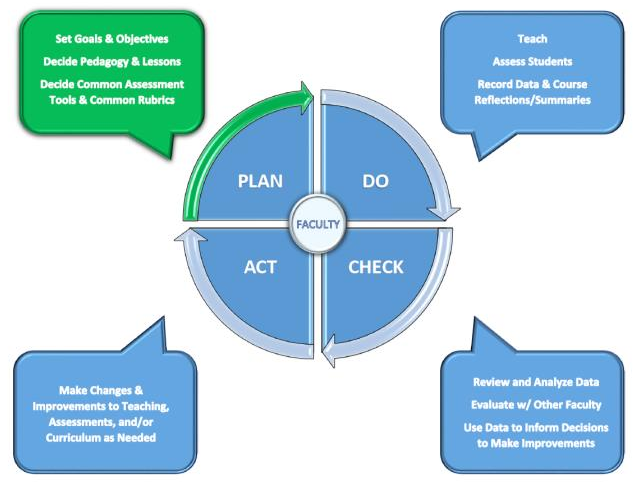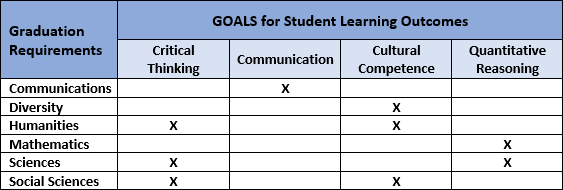Iowa Western measures assessment at various levels within the institution in an effort to use data and results to inform decisions to make improvements. Assessment is monitored through shared governance from the strategic plan by the Assessment Committee with subcommittees overseeing specific areas.
Assessment of Student Learning
Faculty are central to the evaluative process for assessment of student learning which follows a continual cycle as seen in the Plan→Do→Check→Act diagram below. Assessment sessions are scheduled into the academic calendar each year during faculty professional development days to allow faculty dedicated time to work together on assessment initiatives. Faculty Assessment Champions who serve on the Assessment Committee plan the agenda and facilitate the assessment activities.

Student Learning Outcomes
Iowa Western assesses student learning outcomes at the course, program, and institutional level. Starting with the course learning outcomes, each outcome level is mapped to the next level to ensure students are mastering skill and competency levels throughout their program of study. Both direct and indirect measures of student learning are evaluated.
Course Outcomes
As part of the curriculum process at Iowa Western, faculty create course student learning outcomes that are learner-focused. These outcomes are clear, concise, and measurable. Course outcomes are the same for all sections of the course taught, regardless of instructor, modality, or location. Additionally, common assessment tools are used to assess course outcomes. When courses are assigned to multiple faculty, all faculty must agree on the common assessment tool for each outcome. All course student learning outcomes are assessed each fall and spring term.
Examples of Course Level Assessment Measures:
Direct Measures
- Clinical/internship observation followed by rating/evaluation
- Common grading rubric (criterion-based rating scale) scores for writing, oral presentations, or performances
Indirect Measures
- Course grades
- Course evaluations
Program Outcomes
Program learning outcomes are created through the curriculum process at Iowa Western by faculty and academic deans. Career and Technical Education programs receive industry guidance and assistance from advisory committee members to draft program learning outcomes, some programs with third-party accrediting agencies may be directed toward specific outcomes. All program student learning outcomes are reviewed annually.
Examples of Program Level Assessment Measures:
Direct Measures
- Student portfolio, capstone projects, exhibits, or performances
- Pass rates for board or licensure certification
Indirect Measures
- Job placement
- Employer surveys, advisory committee feedback
Institutional Outcomes
Institutional student learning outcomes are determined and reviewed by the Assessment Committee consisting of four broad skills and abilities a student can be expected to do as a result of completing their educational experience at Iowa Western Community College. These student learning outcomes can be mapped to individual course learning outcomes in all programs by way of a variety of graduation requirements. Institutional student learning outcomes are reviewed annually. The following are the four institutional student learning outcomes:
Competency: Students will think critically.
Outcome: Students will be able to demonstrate critical thinking skills
Competency: Students will communicate effectively.
Outcome: Students will be able to express their own ideas in a variety of modes
Competency: Students will recognize the importance of various cultural perspectives.
Outcome: Students will be able to examine diverse cultures/subcultures
Competency: Students will apply quantitative reasoning skills.
Outcome: Students will be able to interpret data

Examples of Institutional Level Assessment Measures:
Direct Measures
- Rubric (criterion-based rating scale) scores for class assignments in General Education core courses required for graduation
Indirect Measures
- Graduation/completion rates
Cocurricular Assessment
Cocurricular assessment at Iowa Western includes learning activities and experiences such as service learning, professional clubs and organizations, honor societies, career services, and athletics. Assessment information includes a variety of student participation quantitative data in these activities as well as qualitative data recognizing student self-reflections with connection to their program of study and overall holistic learning goals.
Examples of Cocurricular Assessment Measures:
Direct Measures
- Service learning experiences (written student reflection of what was learned)
Indirect Measures
- Data tracking student hours/headcount participation in activities